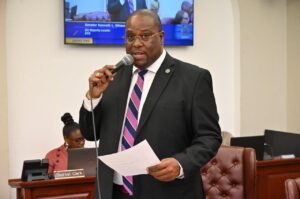
Sen. Kenneth L. Gittens is calling for an emergency Committee of the Whole hearing on the St. Croix water crisis so that both the body and the community will have more information as to the extent of the problem and the response required.
“My colleagues have proposed some remedies; however, none of us are operating with the information necessary to help formulate a comprehensive plan to address this issue,” Sen. Gittens said. “It is unclear at this point as to how many Virgin Islanders are even impacted by this contaminated water.”
Gittens, the 35th Legislature’s majority leader, has requested that an emergency Committee of the Whole hearing be held to hear from officials and residents on this issue. He said that representatives from the Virgin Islands Water and Power Authority, the Department of Planning and Natural Resources, the Health Department, the U.S. Environmental Protection Agency, as well as the Governor’s Financial Team should all take part in the hearing.
“We do not know enough about this water crisis and must seek immediate answers on the record,” he said. “I have written to Senator Novelle E. Francis in hopes that we can convene early next week.”
Sen. Gittens’ questions for officials include:
How many customers are directly impacted by contaminated water and how was this number derived?
Which areas of St. Croix have been tested, which will be tested, and has any water testing taken place on St. Thomas or St. John?
Are there any safe/approved uses of this contaminated water?
What measures can be taken to provide safe water to residents in both the short and long term?
What testing options are available to residents and how can we address the cost of testing water in individual households and businesses?
What are the symptoms of lead poisoning and are there any treatment options?
How long will it take to upgrade the water distribution system and what can be done to speed up the process?
What federal funds may be available under the provisions of the Bipartisan Infrastructure Act to help address this issue?
“This is a serious problem, and a serious response is required,” Gittens said. “First, we had the refinery dropping contaminants on people’s rooftops and now this. I am not sure what the answer is, but I know I have many questions. We may need to bring in portable desalination systems that can bypass WAPA lines and be directly linked to schools and homes without cisterns, as well as distribute drinking water in the meantime. There is much to be discussed.”


